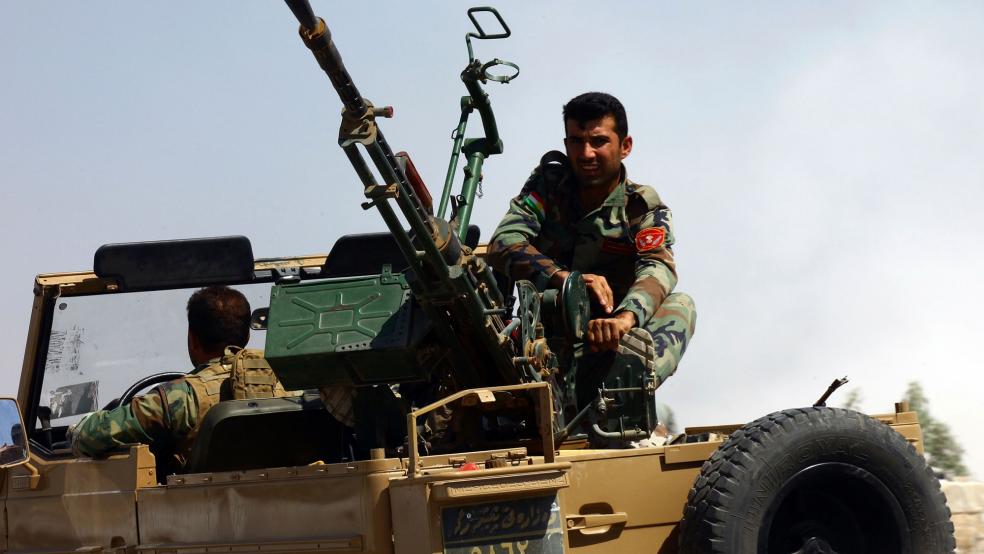Americans have the unfortunate tendency to moralize about the world.
It’s probably the fault of our movie industry, which has, over generations, candied our national ethos into the simple plotlines of John Wayne Westerns, with a reluctant hero alone against the forces of evil. It’s unfortunate because the world is often pretty gray.
The cavalry almost never comes to the rescue, the hostile ranchers usually have a point, and the lonely frontier cowboy is often a lousy father at home. Occasionally there are heroes, even in the Middle East, and if there is one in this third Iraq war, the Kurds might be it.
Related: Kerry Urges Kurdistan Leaders to Be Part of National Government
Certainly, like those movie cowboys, they are alone. The Kurds have been dealt a rough hand by history, trapped between three hostile larger nations whose antipathy for each other is exceeded only by their mutual resolve to prevent Kurdish independence. Theirs resembles, a tiny bit, the Jewish experience, waiting through centuries and genocides for a national security that never quite comes.
But bad geography is not quite a death sentence. If you wait long enough, certain unique moments come around, just every half-millennia or so, when the impossible becomes merely the improbable. The unlikely independence of the Baltic States, for example, came at a unique moment when their historical antagonist Russia was weak, Germany distracted, and a triumphant Western power was handing out security guarantees.
That moment might be here for the Kurds. For over two decades they’ve lived unhappily under a more or less hostile Arab suzerainties, stymied over issues like oil revenue, control of ethnically mixed areas, and possession of enough heavy weapons to make them secure. They’ve had to take it: their weakness in a jungle of malevolent regional banana lands means they have to toe the line, nowhere more so than on independence. Until now.
The problem for nationalistic Kurds has always been the need to find one friendly regional state to back them. Their actions in the current crisis – and Iraq’s political sclerosis – have bought them unprecedented goodwill, direct arms shipments from President Obama and the USA.
Related: If Kurds Fall, Chaos in Iraq and Abroad Will Follow
Over the medium-term, though, they probably can’t count on us. Though the Kurds are riding to the rescue of the Yazidis and Mount Sinjar, and bearing the brunt of the fight against the Islamic State in Iraq and the Levant (ISIL), Washington has been a long-standing opponent of Kurdish independence because of the damage to its relations with Baghdad. That dynamic hasn’t changed: preventing Iraq from slipping totally into Iran’s orbit is worth more to the US than a free Kurdistan.
If not the Americans, then who? Well, because of the region’s deepening Sunni-Shia divide, new strategic options have opened up. For example, their bravery and success against the radical Sunni group ISIL would seem to align them naturally with Iran and its Shia clients like Syria and Hezbollah, who are also fighting against radical Sunnis.
However, a declaration of independence is likely to sour Kurdistan’s relationship with Iraq for a very long time. Iraq, even post-Maliki, is a card-carrying member of the Shia bloc and of far more use to Iran than is Kurdistan. No matter the Kurdish successes against ISIL, it is unlikely that Tehran (let alone Baghdad) would look favorably on independence, particularly since Iran has been troubled by domestic Kurdish insurgencies in the past.
An alliance with Turkey, to Kurdistan’s north, is more possible (barely). Nearly fifty years of blood has run between the Turkey and its Kurdish communities, a result of their repressive treatment in Turkey’s southeast. Turkey is an Iranian rival, and supports the Sunni rebels fighting Assad’s Shia-aligned government in Syria. And so in a very third-degree-of-LinkedIn way, the Kurds are rescuing religious minorities by fighting Turkey’s friend of a friend, ISIL. A Turkish alliance, once the current fighting ends, is unlikely. But because of the Iranian threat, both have something to offer each other for the first time.
Related: US to Seize $100 Million of Iraqi Kurdish Oil in Tanker off Texas
An alliance with the moderate Sunni Arab states like Saudi Arabia, Egypt, and the United Arab Emirates states is more probable. These countries all hate and fear Islamist movements like ISIL, and could be willing to support the Kurds in their fight against it. They also fear Iran, and so might help midwife an independent Kurdistan, significantly weakening the Shia-aligned Iraq, which until 2003 has been a Sunni-led state.
Then, of course, they could do it alone, frontier-style, like John Wayne in the movies, seizing on this unique historical moment to shout GO! Israel, of course, is THE example, born again out of another genocide. It declared independence without great power support and hung on, successfully, in the resulting war mostly through grit.
Today, Israel would probably be a natural ally of the pro-American, non-sectarian Kurdistan, where civil society, stability, and democratic norms have advanced beyond the reach of most Middle Eastern countries. It might be able to help the Kurds hang on, against the likely fury of an Iran, which would see an Israeli-allied Kurdistan as a springboard for potential airstrikes against its nuclear program.
Over the long run, a mix of Israeli and Saudi-Emirati support would probably be enough to keep a free Kurdistan afloat. Without question, a declaration of independence would be a leap into the unknown. It could be a disaster: it could be a disaster involving territorial loss, and it could be a disaster involving genocide. But it might also work. And perhaps, after surviving so many atrocities and leading the fight against a truly horrible terrorist group, the Kurds have earned the right to choose.
Top Reads from The Fiscal Times:






